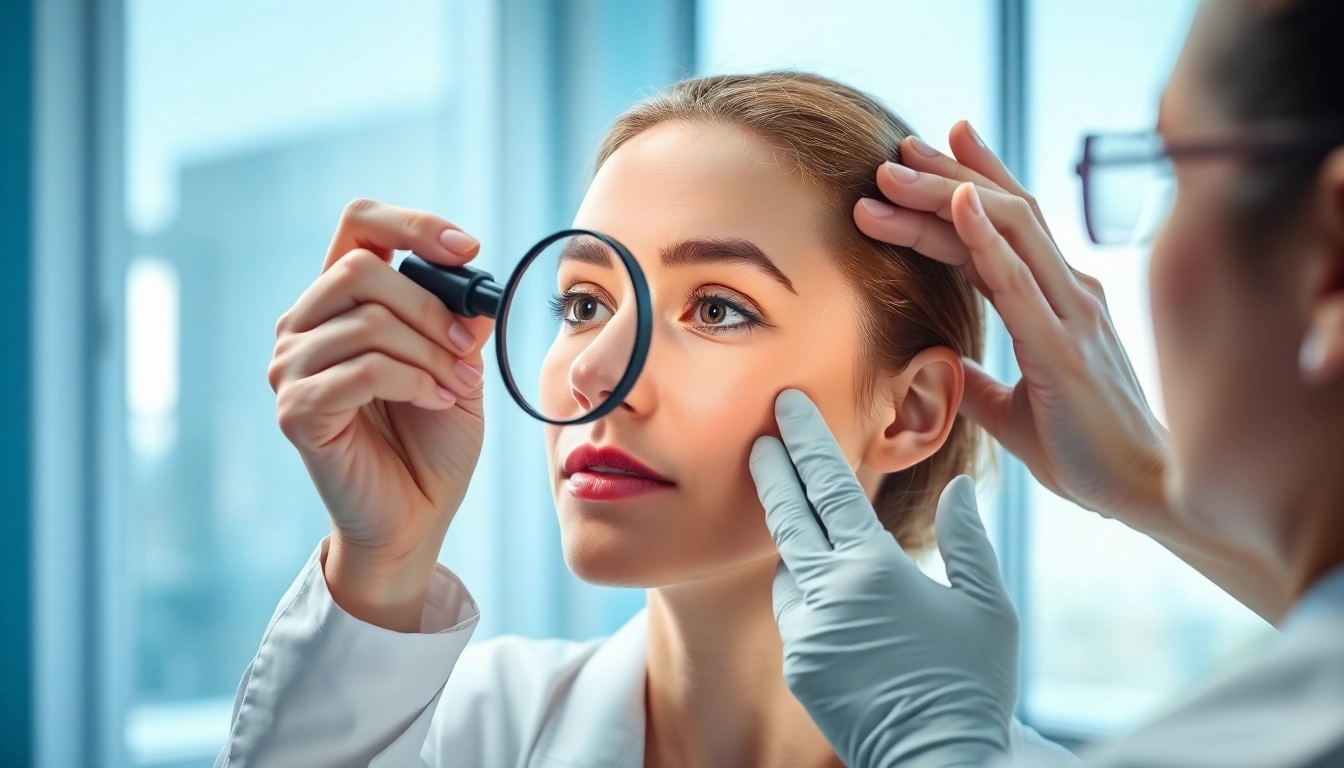1. Overview of Aesthetic Skin Concerns
In an era where first impressions often hinge on visual appearances, the concern for aesthetic skin issues has gained significant attention. People increasingly seek solutions to enhance their skin’s look, texture, and overall vitality. Understanding the various aesthetic skin concerns helps individuals identify their skincare needs and develop effective solutions. From acne to signs of aging, aesthetic skin concerns can vary widely among different demographics, making it essential to approach skin health with tailored information.
1.1 Definition and Types
Aesthetic skin concerns refer to a range of conditions affecting the appearance of the skin, often impacting an individual’s self-esteem. These concerns extend beyond medical dermatological issues to encompass the desire for a more youthful, clear, and vibrant appearance. Common types of aesthetic skin concerns include:
- Acne: A prevalent concern affecting individuals of all ages, characterized by blemishes and inflammation.
- Hyperpigmentation: Dark patches or spots on the skin, often arising due to sun exposure or hormonal changes.
- Wrinkles and Fine Lines: Common signs of aging that contribute to a tired or aged appearance.
- Dry or Dehydrated Skin: Often caused by environmental factors and lacks the necessary moisture.
- Rosacea: A chronic condition that leads to facial redness and visible blood vessels.
- Uneven Skin Tone: Variations in skin color that can present a patchy or inconsistent appearance.
- Loss of Elasticity: A condition often associated with aging, where the skin loses its tightness and firmness.
1.2 Common Symptoms
The symptoms of aesthetic skin concerns can manifest in various forms, often representing underlying issues that may need attention. Some common symptoms include:
- Bumps, pustules, and cysts (characteristics of acne)
- Pigmented lesions or spots
- Visible signs of aging, such as fine lines and sagging skin
- Rough texture or flakiness
- Redness and inflammation
- Itching or discomfort around affected areas
1.3 Importance of Addressing These Concerns
Addressing aesthetic skin concerns extends beyond vanity; it encompasses mental health and overall well-being. Skin issues can affect self-esteem and create anxiety about personal image. Furthermore, certain concerns, like acne, can lead to scarring and long-term skin damage if left untreated. By understanding and treating these issues, individuals can foster not only a more pleasing appearance but also a greater sense of confidence and mental health.
2. Causes of Aesthetic Skin Concerns
The causes of aesthetic skin concerns are manifold, often interlinked through environmental factors, genetics, and lifestyle choices. Identifying these causes is paramount for effective treatment and prevention strategies.
2.1 Environmental Factors
Environmental elements play a crucial role in skin health. Pollution, sun exposure, climate, and even indoor heating can impact the skin negatively. For instance, UV rays contribute to premature aging, while pollutants may lead to oxidative stress that damages skin cells. Making efforts to reduce exposure to harmful elements can significantly improve skin quality.
2.2 Genetic Predispositions
Genetics is another critical factor in aesthetic skin concerns. Individuals may inherit specific skin types, such as oily or dry skin, along with predispositions to conditions like acne or eczema. Understanding family history can guide individuals in selecting appropriate skincare and treatment options to mitigate inherited skin issues.
2.3 Lifestyle Influences
Lifestyle choices greatly influence skin health. Diet, sleep patterns, stress levels, and habits such as smoking and drinking can all contribute to the emergence of aesthetic skin concerns. A balance of nutritious food, adequate hydration, consistent sleep, and effective stress management is essential for maintaining healthy skin.
3. Prevention Strategies for Healthy Skin
Preventing aesthetic skin concerns is possible by implementing proactive skincare strategies and fostering healthy habits. A holistic approach not only protects the skin but also promotes overall wellness.
3.1 Daily Skincare Routine
A consistent skincare routine can vastly enhance the skin’s health. Here are the essential steps:
- Cleanser: Use a gentle cleanser suited to your skin type to remove impurities and excess oil without stripping natural moisture.
- Exfoliation: Exfoliate regularly to remove dead skin cells and promote cell turnover. This should be tailored to your skin type, perhaps opting for chemical exfoliants over harsh scrubs.
- Moisturizer: Apply a moisturizer to hydrate and protect the skin barrier. Look for ingredients like hyaluronic acid, glycerin, or ceramides.
- Sun Protection: Use broad-spectrum SPF daily, even on cloudy days, to protect against the harmful effects of the sun.
3.2 Importance of Hydration
Hydration is integral for healthy skin, both from the inside and outside. Drinking adequate water helps maintain skin moisture levels. Additionally, including hydrating products like serums or essences in your routine can boost skin hydration and elasticity.
3.3 Protecting Skin from Sun Damage
The sun’s ultraviolet rays can cause immediate and long-term damage, leading to conditions such as sunburn, pigmentation, and melanoma. Wearing protective clothing, seeking shade, and using broad-spectrum sunscreen are paramount. Regularly reapplying sunscreen every two hours and after swimming or sweating can significantly enhance skin protection.
4. Treatments for Aesthetic Skin Concerns
When aesthetic skin concerns manifest, a variety of treatment options are available, ranging from topical solutions to professional interventions.
4.1 Topical Solutions and Creams
Topical treatments can be effective in managing a range of skin issues. Here are some widely used topical solutions:
- Retinoids: Derived from vitamin A, retinoids help reduce signs of aging and acne.
- Hydroquinone: A bleaching agent designed to lighten hyperpigmented areas.
- Salicylic Acid: A beta-hydroxy acid that is particularly effective for treating acne.
- Moisturizers: Creams infused with ingredients like peptides or antioxidants can aid in hydration and skin repair.
4.2 Professional Treatments
In some cases, individuals may require professional treatment options, such as:
- Chemical Peels: Helps to exfoliate the top layers of skin to diminish fine lines and age spots.
- Laser Therapy: Targets specific skin concerns, including wrinkles, scars, and pigmentation.
- Microneedling: Involves tiny needles creating micro-injuries to stimulate collagen production.
- Fillers and Botox: Non-surgical options to enhance volume or minimize the appearance of fine lines.
4.3 Lifestyle Changes and Home Remedies
In addition to medical treatments, certain lifestyle adjustments and home remedies can alleviate aesthetic skin concerns:
- Balanced Diet: Incorporating fruits, vegetables, healthy fats, and staying hydrated can aid in improving skin health.
- Sleep: Prioritize quality sleep as it plays a vital role in skin repair and regeneration.
- Stress Management: Techniques such as yoga, meditation, or regular exercise can lower stress levels, benefitting skin health.
- Natural Remedies: Ingredients like aloe vera, honey, and green tea can be incorporated for their soothing and anti-inflammatory properties.
5. Maintaining Long-term Skin Health
Long-term skin health relies on a consistent, proactive approach. Building habits and seeking support can ensure the skin remains vibrant and resilient.
5.1 Regular Dermatological Check-ups
Regular visits to a dermatologist can provide personalized advice and prompt detection of potential concerns. Specialists can keep track of skin changes and recommend periodic treatments or preventive measures tailored to individual needs.
5.2 Adapting to Changing Skin Needs
As we age or undergo lifestyle changes, our skin’s needs evolve. It’s crucial to remain adaptable, reviewing and adjusting skincare routines and products to match changing conditions. Seasonal changes, hormonal variations, and new concerns should prompt reassessment of skincare regimens.
5.3 Building a Supportive Community
Finding a community, whether online or among friends and family, can provide encouragement and shared experiences regarding aesthetic skin concerns. Supporting one another in this journey, sharing tips, and discussing treatment experiences can foster a sense of belonging and positivity.



